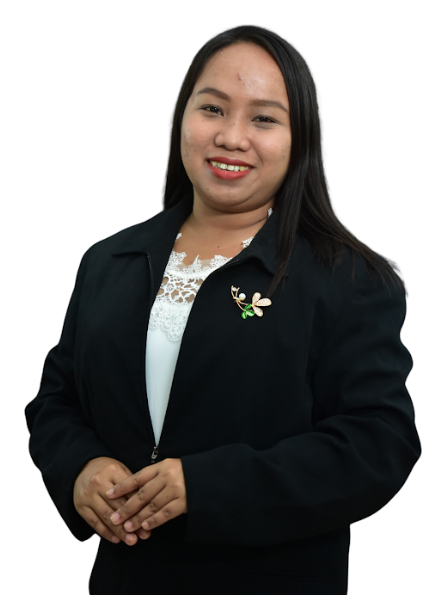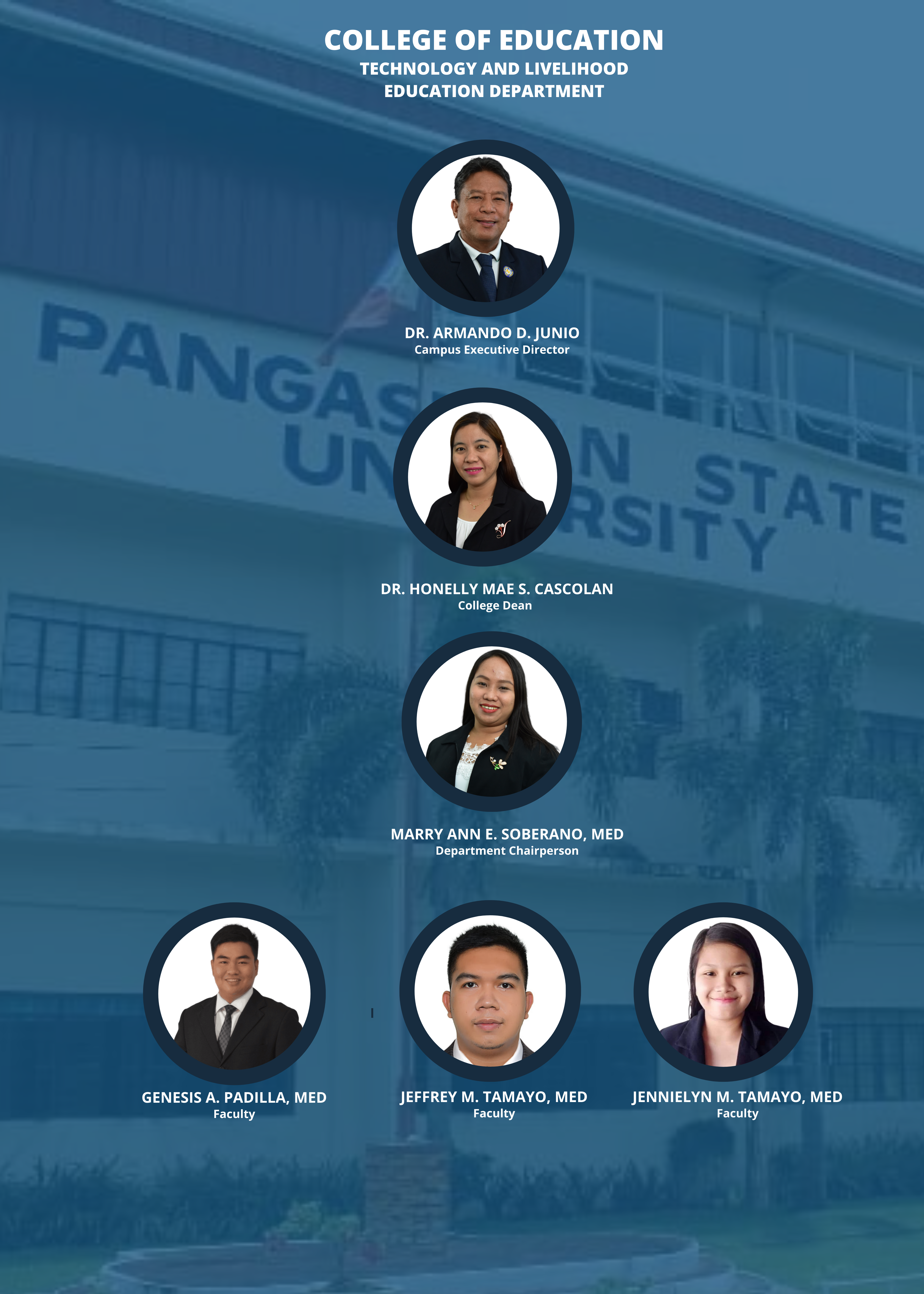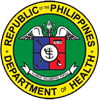
Welcome to the BTLed Department!
Good day! The BSE and BTLEd Department is exhilarated to welcome you to the Pangasinan State University- Asingan campus webpage where numerous information about our institution is found. We are delighted to know you are interested to learn about our campus such as our course offerings and other easily accessible activities. Have the time to grasp and be inspired thru browsing our webpage.
The Pangasinan State University-Asingan Campus adheres with the value that aims students to become inspired and be passionately driven with their quest to finish their studies. It also assures to produce caliber graduates who can keep pace with the fast-changing society. This is possible because the PSU-Asingan campus offers excellent services to students and guarantees quality education by employing experts in the field of teaching and allied fields.
As the saying goes “If you want to achieve success in life, you should have courage and determination in yourself”, with that, the PSU-Asingan Campus family will help you achieve your goals in life, will teach you to have courage and determination to finish your studies, and will provide you with many opportunities that you can choose from in order for you to become the best way you can be.
Program Description
The BTLED program is an undergraduate teacher education program that equips learners with adequate and relevant Competencies in the area of Technology and Livelihood Education, particularly for the TLE exploratory courses from Grades 4-8.
Technology and Livelihood Education is an allied discipline which draws from many of the basic disciplines in the social sciences, science and math, engineering and technology, and related fields humanities.
Program Objectives
The intent of the BTLED program is to produce teachers who are able to meet the demands of the teaching profession, both local and national area and in the ASEAN region. It has the following objectives: (BTLED 2021 Curriculum with CHED Contents Notation)
- Demonstrate through institutional mechanisms, systems, policies, and processes which are reflective of transparency, equity, participatory decision making, and accountability;
- Engage in relevant, comprehensive and sustainable development initiatives through multiple perspectives in decisions and actions that build personal and professional credibility and integrity.
- Set challenging goals and tasks with determination and sense of urgency which provide continuous improvement and producing quality outputs leading to inclusive growth;
- Exhibit life-long learning and global competency proficiency in communication skills, inter/interpersonal skills, entrepreneurial skills, innovative mindset, research and production initiatives and capability in meeting the industry requirements of local, ASEAN and international human capital market through relevant and comprehensive programs;
- Display, socially and environmentally responsive organizational culture, which ensures higher productivity among the university constituents and elevate the welfare of the multi-sectoral communities and;
- Practice spiritual values and morally upright behavior which promote and inspire greater harmony to project a credible public image.
Organizational Chart

EMPLOYMENT OPPORTUNITIES
|
|
|
Program Outcomes
|
GRADUATE ATTRIBUTES |
PROGRAM OUTCOMES |
PERFORMANCE INDICATORS |
|
Technically Skilled |
Articulate and discuss the latest developments in the specific field of practice. (CTS 1) Demonstrate the competencies required of the Philippine TVET Trainers-Assessors Qualifications Framework (PTTQF). (SM 1) Demonstrate broad and coherent, meaningful knowledge and skills in technology and livelihood education. (SM 2) |
Conduct technical training and competency assessment. |
|
Community Developer |
Develop innovative curricula, instructional plans, teaching approaches, and resources for diverse learners. (CD 4) Demonstrate a variety of thinking skills in planning, monitoring, assessing, and reporting learning processes and outcomes. (CD 6) Apply a wide range of teaching process skills (including materials Curriculum development, lesson planning. development, educational assessment, and teaching approaches). (SM 7) |
Design and develop curriculum, courses and instructional materials. |
|
Knowledgeable and skilled Communicator |
Set challenging goals and tasks with determination and sense of urgency which provide continuous improvement and producing quality outputs leading to inclusive growth. (ILO 3) Facilitate learning using a wide range of teaching methodologies and delivery modes appropriate to specific learners and their environments. (CD 3) Manifest a deep and principled understanding of the learning processes and the role of the teacher in facilitating these processes in their students. (SM 5) |
Supervise and mentor technical students. |
|
People’s Champion |
Demonstrate broad and coherent, meaningful knowledge and skills in technology and livelihood education. (SM 2) BTLEd graduates of professional institutions demonstrate a service orientation in one’s profession. (CHT 1) |
Extend the body of knowledge in the field of technical-vocational education and training. |
|
Continuous – innovative Learner |
Demonstrate mastery of subject matter/discipline. (CD 2) Apply skills in the development and utilization of ICT to promote quality, relevant, and sustainable educational practices. (CD 5) |
Demonstrate competence/ and mastery in meaningfully teaching EPP/TLE. |
|
Knowledgeable and skilled Communicator |
Effectively communicate orally and in writing using both English and Filipino. (CTS 2) Articulate the rootedness of education in philosophical, socio- cultural, historical, psychological, and political contexts. (CD 1) Facilitate learning using a wide range of teaching methodologies and delivery modes appropriate to specific learners and their environments. (CD 3) |
Facilitate the teaching-learning of EPP/TLE. |
|
People’s Champion |
Demonstrate through institutional mechanisms, systems, policies, and processes which are reflective of transparency, equity, participatory decision making, and accountability. (ILO 1) Reflect on the relationships among the teaching process skills, the learning processing in the students, the nature of the content/subject matter, and other factors affecting educational processes in order to constantly improve their teaching knowledge, skills and practices. (SM 8) |
Relate lesson with other lessons in the course and with other disciplines. |
|
People’s Champion |
Exhibit life-long learning and global competency proficiency in communication skills, inter/interpersonal skills, entrepreneurial skills, innovative mindset, research and production initiatives and capability in meeting the industry requirements of local, ASEAN and international human capital market through relevant and comprehensive programs. (ILO 4) |
Demonstrate competence in applying specialized knowledge and skills with confidence. |
|
Technically Skilled |
Demonstrate mastery of subject matter/discipline. (CD 2) Apply skills in the development and utilization of ICT to promote quality, relevant, and sustainable educational practices. (CD 5) |
Demonstrate mastery in teaching EPP/TLE. |
|
Technically Skilled |
Facilitate learning using a wide range of teaching methodologies and delivery modes appropriate to specific learners and their environments. (CD 3) |
Develop one’s own teaching strategies to attain a learning outcomes. |
|
Continuous – innovative Learner |
Reflect on the relationships among the teaching process skills, the learning processing in the students, the nature of the content/subject matter, and other factors affecting educational processes in order to constantly improve their teaching knowledge, skills and practices. (SM 8) Pursue lifelong learning for personal and professional growth through varied experiential and field-based opportunities. (CD 8) |
Reflect on teaching strategies and skills to continuously improve on them. |
|
Knowledgeable and skilled Communicator |
Effectively communicate orally and in writing using both English and Filipino. (CTS 2) Demonstrate higher level literacy, communication, numeracy. critical thinking, learning skills needed for higher learning. (SM 4) |
Communicate ideas clearly and accurately in oral and written form. |
|
Civic Oriented Citizenship |
Practice professional and ethical teaching standards sensitive to the local, national, and global realities. (CD 7) Demonstrate higher level literacy, communication, numeracy. critical thinking, learning skills needed for higher learning. (SM 4) |
Make sound judgment and decision after critical evaluation of ideas. |
|
People’s Champion |
Manifest a deep and principled understanding of the learning processes and the role of the teacher in facilitating these processes in their students. (SM 5) Show a deep and principled understanding of how educational processes relate to larger historical, social, cultural, and political processes. (SM 6) |
Facilitate learning by applying time-tested principles of learning |
|
Technically Skilled |
Apply a wide range of teaching process skills (including materials Curriculum development, lesson planning. development, educational assessment, and teaching approaches). (SM 7) |
Employ interactive, collaborative, integrative, and reflective teaching-learning activities |
|
Civic Oriented Citizenship |
Practice spiritual values and morally upright behavior which promote and inspire greater harmony to project a credible public image. (ILO 6) Articulate the rootedness of education in philosophical, socio- cultural, historical, psychological, and political contexts. (CD 1) |
Teach based on sound principles and philosophies of education; |
|
Civic Oriented Citizenship |
Display, socially and environmentally responsive organizational culture, which ensures higher productivity among the university constituents and elevate the welfare of the multi-sectoral communities. (ILO 5) |
Relate teaching-learning to the historical, social, cultural and political context |
|
Civic Oriented Citizenship |
Articulate the rootedness of education in philosophical, socio- cultural, historical, psychological, and political contexts. (CD 1) Show a deep and principled understanding of how educational processes relate to larger historical, social, cultural, and political processes. (SM 6) |
Show how historical, social, cultural and political processes impact on teaching-learning; |
|
Technically Skilled |
Facilitate learning using a wide range of teaching methodologies and delivery modes appropriate to specific learners and their environments. (CD 3) |
Use varied teaching approaches and strategies relevant to EPP/TLE |
|
Community Developer |
Develop innovative curricula, instructional plans, teaching approaches, and resources for diverse learners. (CD 4) |
Implement effectively the curriculum and assess its relevance and responsiveness to the needs of the clientele. |
|
Technically Skilled |
Demonstrate a variety of thinking skills in planning, monitoring, assessing, and reporting learning processes and outcomes. (CD 6) |
Observe alignment of outcomes, teaching-learning activities and assessment tasks in lesson planning. |
|
Technically Skilled |
Demonstrate a variety of thinking skills in planning, monitoring, assessing, and reporting learning processes and outcomes. (CD 6) |
Use appropriate traditional and authentic assessment tools to assess learning and to inform instruction. |
|
Knowledgeable and skilled Communicator |
Facilitate learning using a wide range of teaching methodologies and delivery modes appropriate to specific learners and their environments. (CD 3) Apply skills in the development and utilization of ICT to promote quality, relevant, and sustainable educational practices. (CD 5) |
Utilize varied and appropriate Instructional technology to facilitate and enrich instruction; |
|
Community Developer |
Work effectively and independently in multi-disciplinary and multi-cultural teams. (CTS 3) |
Integrate principles of teaching and learning, theories on human development and social context of the learner for relevant and effective teaching. |
|
Community Developer |
Practice professional and ethical teaching standards sensitive to the local, national, and global realities. (CD 7) |
Practice reflective teaching |
|
Community Developer |
Apply skills in the development and utilization of ICT to promote quality, relevant, and sustainable educational practices. (CD 5) |
Adapt innovative learning practices |


